How to Use ‘to be + V3’ in English grammar
आज के इंग्लिश लेसन में आप सीखेंगे Use ‘to be + V3’ in इंग्लिश ग्रामर
use ‘to be + V3’ – कुछ होने को है , कोई काम बाकी है , होने को था ( इसका use हम तब करते है जब कोई काम अभी पूरा नही हुआ होता अभी होने वाला है )
Watch video for help:
Is/am/are + to be + v3 ( काम किया जाना है )
Has / have + to be + v3 (compulsion) ( काम किया जाना है ) for compulsory action (हर ऱोज करना है या करना पड़ता है )
Was / were + to be + v3 ( काम किया जाना था )
Had + to be + v3( compulsion) ( काम किया जाना था ) compulsory action
इसका काफी use हम देखते है जब newspaper पढ़ते है या news headlines पढ़ते है | और हमे subject का पता नही होता तो हम passive form use करते है |
let’s discuss some examples:
- These clothes are to be washed.
- Ye kapde dhoye jane hai.
- Children are to be sent to school.
- Bacho ko school bheja jana hai.
- Guitar is to be played.
- Guitar bjaya jana hai.
- Window is to be installed.
- Window intall kri jani hai.
- Decision is to be made.
- Faisla abhi liya jana hai.
- Case is to be decided.
- Case ka faisla abhi liya jana hai.
- I am to be there by 11 pm.
- Mujhe 11 bje vha hona hai.
Was / were + to be + v3 ( काम किया जाना था )
- This room was to be cleaned yesterday.
- Kal karma saaf kiya jana tha.
- Medicine was to be kept cold.
- Dwai ko thanda rakhan jana tha.
- He was to be asked.
- Us se poochha jana tha.
- Kids were to be praised for their hard work.
- Bacho ki mehnat ke liye unki prashansha ki jani thi .
- Hme btaya jana tha.
- We were to be told.
- Rooms need to be cleaned.
- Kamre ko saaf kiye jane ki jroorat hai.
- Kapde dhoye jane the.
- The clothes had to be washed.
- Khana abhi khana hai.
- Lunch is to be taken yet.
Watch the video to know more about the use ‘to be + v3’ in english.
- Gift abhi khole jane hai.
- Gifts are to be opened yet.
- Ladki abhi dekhni hai.
- Girl is to be found yet.
- Mobile abhi khridna tha.
- Mobile was to be purchased yet.
- Ticket abhi leni hai.
- Ticket has to be taken / purchased yet.
- Khana abhi pkaya jana hai .
- Food is to be cooked yet.
- He needs to be told his duty.
- Usko uski duty btaye jane ki jroorat hai.
- It needs to be done .
- Isko kiye jane ki jroorat.
- Dusting needs to be done.
- Dusting kiye jane ki jroorat hai.
Top 50 Confusing English Sentences for Daily use
Hello friends , if you are interested in speaking English fluently तो आपको पता ही होगा की कभी कभी हिंदी में कुछ ऐसे Confusing English Sentences आ जाते है जिनको Translate कर पाना बहुत मुश्किल हो जाता है और जिससे की हमारी अंग्रेजी पर काफी फर्क पड़ता है। So, in today’s article you will learn ‘ Top 50 Confusing English Sentences for Daily use .
Video help for Top 50 Confusing English Sentences for Daily use:
- मेरी उससे बोल चाल बंद है
- Meri usse bol chal band hai .
- I am not on speaking terms with him.
- तूने तो सबकी बोलती बंद कर दी।
- Tune to sabki bolti band kar di.
- You kept everyone’s mouth shut.
- तुम्हारी जान को खतरा है।
- Tumhari jaan ko khtra hai.
- Your life is in Danger.
- वो हमेशा अपनी चलाता है |
- Wo hmesha apni chlata hai .
- He always has his way.
- वो घोड़े बेचकर सो रहा होगा |
- Veh ghore bech kar sota hoga.
- He is having a sound sleep.
let’s learn Confusing English Sentences for Daily use through video:
- तुम मेरे लगते क्या हो?
- Tum mere lagte kya ho ?
- Who are you to me?
- अगर मेरा बस चले तो मै तुझे गोली मर दू |
- Agar mera bus chle to mai tujhe goli maar du.
- I would shoot you If I had my way.
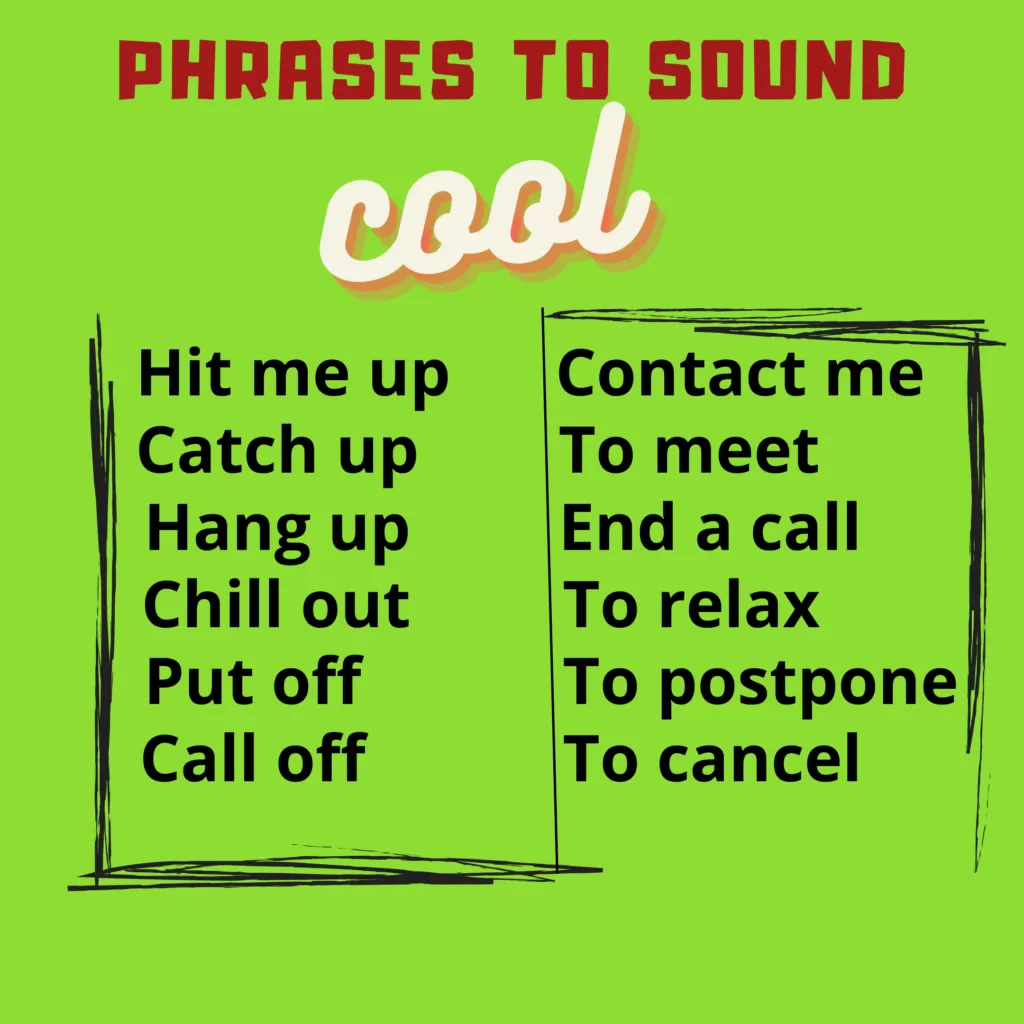
- तुम्हारी औकात नहीं है मुझसे बात करने की|
- Tumhari aukaat nhi mujhse baat karne ki.
- You are not worthy of talking to me.
- मुझे चक्कर आ रहे है|
- Mujhe chakar aa rhe hai .
- I am feeling giddy .
- क्या तुम अपना वादा निभा पाओगे?
- Kya tum apna vayda nibha paoge?
- will you be able to fulfill your promise?
- तुमने मेरे सारे सपने मिटटी में मिला दिए|
- Tumne mere sare sapne mitti me mila diye.
- You shattered all my dreams .
- इस बार तुम्हारे बहाने नहीं चलेंगे|
- Iss baar tumhare bhane nhi chalege.
- Your excuses won’t do this time.
- तुम्हे किसी की नज़र न लगे |
- Tumhe kisi ki najar na lge .
- Let No evil eye cast you .
- तुमने मेरी मुँह की बात छीन ली|
- Tumne mere muh ki baat chheen li.
- You snatched the word out of my mouth.
- अच्छे से अच्छे लोग भी गलती करते है|
- Achche se achche log bhi galtiya karte hai .
- Even the great people make mistakes.
- मैं बात का पक्का आदमी हूँ|
- Mai baat ka pakka aadmi hu.
- I am the man of words.
- तुम उसकी बातों में कैसे आ गये?
- Tum uski baton me kaise aa gye ?
- How were you taken in by his words?
- बात बहुत बिगड़ गयी है|
- Baat bahut bigad gyi hai .
- The matter has taken the serious turn.
- तुम्हे किसकी हवा लगी है ?
- Tumhe kiski hwa lag gyi ?
- Under whose influence are you?
- इसमे तेरा क्या जाता है?
- Isme tera kya jata hai ?
- How does it concern you?
- Yeh glass jootha hai .
- It is a used glass.
- उल्टा चोर कोतवाल को डांटे|
- Ulta chor kotwal ko dante.
- The pot is calling the kettle black .
- तूने तो मेरी नाक कटवा दी |
- Tune to meri naak katwa di .
- You let me down.
- ज्यादा नखरे मत दिखाओ |
- Jyada nkhre mat dikhao.
- Don’t show tantrums so much.
- मुझ पर एक एहसान करो|
- Mujh par ek ehsaan kro .
- Do me a favor.
- तुम्हारे चेहरे पे कुछ लगा है|
- Tumhare chehre pe kuchh lga hai .
- There is something on your face .
- हमारी खूब पटती है |
- Hmari khoob pat-ti hai .
- We get along very well.
- वो मुझे भाव नहीं देती |
- Veh mujhe bhav nhi deti .
- She doesn’t pay attention to me .
- मेरा कुछ करने का मन नहीं कर रहा है |
- Mere kuchh karne ka man nhi kar rha hai .
- I don’t feel like doing anything.
- तुमसे न हो पायेगा |
- Tumse na ho payega.
- You won’t be able to do.
- तुम्हारी तो नाक बह रही है |
- Tumhari to naak veh rhi hai .
- You have a runny nose.
- मैं भीग चुका हूँ |
- Mai bheeg chukka hun .
- I have drenched .
- वो ऊँचा सुनता है |
- Veh uncha suntan hai .
- He is hard of hearing
- मुझे कम दिखाई देता है |
- Mujhe kam dikhai deta hai .
- I am short of sight.
- तुम दिमाग से पैदल हो |
- Tum dimag se paidl ho .
- You are off with the mind .
- सब ठीक है |
- Sab theek hai .
- All is well.
- तुम मेरे पीछे क्यों पड़े हो?
- Tum mere peechhe kio pde ho?
- Why are you after me?
- मैं दौलत का भूखा नहीं हूँ |
- Mai dulat ka bhookha nhi hun .
- I am not hungry for wealth
- ताली दोनो हाथो से बजती है|
- Taali dono hatho se bajti hai .
- It takes two to make a quarrel
- तुम कब सुधरोगे ?
- Tum kab sudhroge?
- When will you mend your ways?
- समय पर किसका बस चलता है |
- Smay par kiska bus chalta hai .
- Who rules on time.
- सब वक़्त वक़्त की बात है|
- Sab vakt vakt ki baat hai .
- It is all about time .
- मैं अपने वादे से नहीं मुकरता .
- Mai apne vayde se nhi mukrta .
- I don’t weasel out.
- उससे बात करने का कोई फायदा नहीं है |
- Usse baat karne ka koi fayeda nhi hai .
- It is no use talking to him.
- दाल में कुछ काला है |
- Daal me kuchh kala hai .
- There is something fishy.
- हर कुत्ते का दिन आता है |
- Har kutte ka din aata hai.
- Every dog has a day.
- मै उस पर फ़िदा हो गया हूँ |
- Mai uss par fida ho gya hu.
- I have fallen for her.
- इश्क़ ने हमे निकक्मा कर दिया वरना हम भी आदमी काम के थे |
- Ishk ne hme nikkama kar diya vrna hum bhi aadmi kaam ke thee.
- Love made me useless otherwise I too was a man of helping.
- मै उस पर फ़िदा हो गया हु|
- Mai uss par fida hu.
- I have fallen for her.
30 Common English Questions and Answers for beginner
30 Common English Questions and Answers for beginners which is helpful for English Speaking Practice .
Video on 30 Common English Questions and Answers for beginner for help:
QUESTION 1 : WHAT DO YOU DO?
( AAp kya karte hai?)
ANSWERS:
I’m a student. ( Mai ek vidiyarthi hu)
I work in a bank.
I’m unemployed at the moment.
I run my own business.
QUESTION 2 : How do you do ? ( Formal) / How are you ? ( Formal/ Informal)
( Aap kaise hai ?)
Answers:
Very well , thank you. And you?
I am fine , thank you . And you?
QUESTION 3 : HOW WAS YOUR DAY?
( Apka din kaisa rha?)
Answers :
Really good!
Pretty uneventful.
(This means that nothing particularly special or interesting happened during the day)
Very productive.
Super busy.
Question 4: CAN YOU GIVE ME A HAND?
( kya aap meri mdad kar sakte hai ?)`
Answers :
Of course!
I’d be glad to.
Will it take long?
Sure – just a sec.
This means “just a second” – you need the other person to wait one moment before you can help them.
Sorry – I’m a bit busy at the moment.
Question 5 : WHAT HAVE YOU BEEN UP TO LATELY?
( Aaj kal kya chal rha hai ? )
Answers :
I’ve been working a lot.
Mostly studying.
I’ve been taking it easy.
(This means “relaxing, not doing anything intense or stressful.”)
Planning my summer vacation.
Nothing much.
Question 6 : WHAT’S THE MATTER?
( Kya hua ?)
Answers :
Oh, I’m just having a rough day.
Nothing, I’m fine.
Question 7 : WHAT WOULD YOU LIKE TO DRINK?
( Aap kya piyenge ? )
Answers :
Iced tea, please.
Just water for me.
Nothing for me, thanks.
Question 8 : WHAT are you into ?
( Aapko kya pasand hai? )
Answers :
I am into reading books.
I am into learning something new.
I am into singing.
Question 9 : ARE YOU MARRIED?
( Kya aap vivahit hai ?)
Answers :
Yes, I am married.
I’m engaged .
No, but I’m in a relationship.
Nope, I’m single.
Question 10 : What is the time ?
( kya vakt hua hai ?)
Answers :
It’s ten o’clock.
It’s half past four. (4:30)
It’s a quarter to twelve.( “11:45”)
Let me check my phone.
Sorry, I don’t know.
Question 11 : When is your birthday?
( Aapka janam din kab hai ?)
Answer: My birthday is on January 1st.
Question 12 : What is your phone number?
( Aapka phone no. kya hai ?)
Answer: My phone number is 61709832$$$.
Question 13 : What company do you work for?
( Aap kon so company ke liye kaam karte hai ?)
Answer: I work for an investment bank.
Question 14: How many children do you have?
( Aaapke kitne bachche hai ?)
Answer:
I have 2 children.
I do not have any children.
Question 15: Do you have any siblings?
( kya aapka koi bhai behan hai ?)
Answer:
– I don’t have any siblings.
– I have 2 brothers and 2 sisters.
Question 16 : What time do you get up?
( Aap kitne bje uthte hai ?)
Answer: I usually get up at 5.30am.
Question 17 : What time do you go to bed?
( Aap kitne bje sote ho ?)
Answer: I go to bed at 11pm.
Question 18 : What time do you go to school?
( Aap kitne bje school jate ho ?)
Answer: I go to school at 6.40am.
Question 19 : What is your major?
( Apka mukhey vishey kon sa hai ?)
Answer: My major is Computer Science.
Question 20 : Which grade are you in?
( Aap kon si class me ho ?)
Answer: I’m in 8th grade.
Question 21 : Which year are you in?
( Aap kon se saal me ho ?)
Answer:
I’m in my third year.
I am a freshman.
I’m in my final year.
Question 22: What’s on your mind?
( Aapke dimag me kya chal rha hai ?)
Answer:
I am just thinking.
I was just daydreaming.
It’s none of your business.
Question 23: Would you mind opening the window?
( kya kripya khidki khol denge ?)
Answer: It would be my pleasure.
Question: Can I try it on?
( Kya mai ye pehn kar dekh sakti hu ? )
Answer: Sure, the changing rooms are over there.
Question 24: How long it will take you to come ?
( Aapko aane me kitna vakt lgega ?)
Answer :
I will be there in 30 minutes.
( aade ghante me mai vha pahunch jaunga )
Question 25 : Do you want to go ?
( Kya aap nhi jana chahte ho ?)
Answer :
Yes , I want to go.
No, I don’t want .
Question 26 : What brings you here ?
( kaise aana hua ?)
Answer :
I am here to meet you.
Simple Classroom English for teachers and students part – 3
I have tried to explain Simple Classroom English for teachers and students Teachers generally speak these English sentences in classroom while teaching students.
Video help for Simple Classroom English for teachers and students:
30 Simple Classroom English for teachers and students:
1. Good morning, Students.
(गुड मोर्निंग, स्टूडेंट्स)
2. Sit down
(सिट डाउन)
बैठ जाओ।
(baith jao)
3. Attend your roll call.
(अटेंड युअर रोल काल)
अपनी हाजरी लगाओ।
(apni haziri lagao)
4. Take out your notebook.
(टेक आउट युअर नोटबुक)
अपनी नोटबुक निकालो।
(apni notebook nikalo)
5. Please open your books on page no….
(प्लीज ओपन युअर बुक्स ओन पेज नंबर ………….)
अपनी किताब का पेज न…… खोलो।
(apni book ka page no. —— kholo)
6. We will continue with chapter no….
(वी विल कंटिन्यू विद चैप्टर नंबर………………)
हम ……… पाठ से दोबारा शुरू करेंगे।
(hum …….. path se dobara shuru karenge)
Watch video on Simple Classroom English for teachers and students
7. Don’t speak out.
(डोन्ट स्पीक आउट)
ज्यादा मत बोलो।
(jyada mat bolo)
8. Turn to page no…..
(टर्न टू पेज नंबर ………..)
पेज न. ……… निकालो।
(page no. ……. Nikalo)
9. How many of you are without books?
(हाओ मेनी ऑफ़ यू आर विदाउट बुक्स)
आप में से किस के पास किताबें नहीं हैं।
(aap mein se ki ke paas nahin hain)
10. Do you have your own books?
(डू यू हैव युअर ओन बुक्स)
क्या आपके पास अपनी किताबें हैं।
(kya aap ke paas apni kitabein hain)
11. No noise please.
(नो नॉइज़ प्लीज़)
कृपया शोर न करें।
(kripya shor na karein)
12. No whispering please.
(नो व्हिस्प्रिंग प्लीज़)
कानाफूसी न करो।
(kanafusi na karo)
13. Riya stand up and tell me…..
(रिया स्टैंड अप एंड टेल मी)
रिया खड़े हो जाओ और मुझे बताओ……….. ।
(Riya khade ho jao aur muje batao)
14. Very good , sit down.
(वैरी गुड, सिट डाउन)
बहुत अच्छा, बैठ जाओ।
(bahut achha, baith jao)
15. You are not listening carefully, I will ask you again.
(यू आर नॉट लिस्निंग केयरफुली, आई विल आस्क यू अगेन)
आप ध्यान से नहीं सुन रहे हो, मैं दोबारा बता रही हूँ।
Aap dhyan se nahin sun rahe ho, main dobara bata rahi hu)
16. Can’t you sit still?
(कैन नॉट यू सिट स्टिल)
क्या आप टिक कर नहीं बैठ सकते।
(kya aap tik kar nahin baith sakte)
17. Why are you talking?
(वाय आर यू टॉकिंग)
आप बातें क्यूँ कर रहे हो।
(aap batein kyun kar rahe ho)
18. You stand up , come to this bench with your books.
(यू स्टैंड अप, कम टू दिस बेंच विद युअर बुक्स)
खड़े हो जाओ और अपनी किताबें लेकर इस बेंच पर आ जाओ।
(khade ho jao aur apni kitabein lekar is bench par aa jao)
19. Now, mark the answers.
(नाओ, मार्क द अन्स्वर्स)
अब उत्तर पर निशान लगाओ।
(ab uttar par nishan lagao)
20. Are you following me?
आर यू फोलोविंग मी)
क्या आप मुझे सुन रहे हो।
(kya aap mujhe sun rahe ho)
21. I am repeating.
(आई एम् रिपिटिंग)
मैं दोबारा बोल रही हूँ।
(main dobara bol rahi hu)
22. Write all these answers in your notebook. I will check it tomorrow.
(राइट आल दीज़ अन्स्वर्स इन युअर नोटबुक, आई विल चेक इट टुमारो)
ये सारे उत्तर अपनी नोटबुक में लिखो, मैं कल चेक करुँगी।
(ye sare uttar apni notebook mein likho, main kal check karungi)
23. Work in groups.
(वर्क इन ग्रुप्स)
24. I didn’t catch.
(आई डिड नॉट कैच)
मुझे सुनाई नहीं दिया।
(mujhe sunai nahin diya)
25. Could you repeat that please.
(कुड यू रिपीट देट प्लीज़)
क्या आप दोबारा बोलेंगे।
(kya aap dobara bolenge)
26. Can you speak more slowly.
(कैन यू स्पीक मोर स्लोली)
क्या आप थोडा धीरे बोलेंगे।
(kya aap thoda dheere bolenge)
27. How to spell this word.
(हाओ टू स्पेल दिस वर्ड)
इस शब्द को कैसे ठीक करना है।
(Is shabd ko kaise theekkarna hai)
28. What does this mean?
(वट डज़ दिस मीन)
इसका क्या मतलब है।
(isska kya matlab hai)
29. Can you give me example of ….?
(कैन यू गिव मी एक्साम्प्ल ऑफ़ ……..)
क्या तुम मुझे इसका कोई उदहारण दे सकते हो।
(kyat um mujhe isska koi udharan de sakte ho)
English Speaking Practice for beginners by using -Let
In today’s lesson I have shared English sentences which can be used for English Speaking Practice for beginners .I tried to explained the concept of let for daily use English.
- Letme in.
- Mujhe andr aane do.
Let go : Janne do/ chhod do
- Let go ofmy hand.
- Mera hath chhod do.
- Helet go ofthe rope.
- Usne rasi chhod di.
- You need tolet go ofthe past.
- Beeti baton ko bhulla do.
- Letme buy you another one
- Mujhe tumhare liye ek or lene do.
- Letme google that for you.
- Mujhe ye tumhare liye google pe dhoondne do.
- Letme put off this decision
- Mujhe ye faisla radd karne do.
- Letme show you an example.
- Mujhe ek udhahran dene do.
- Letme take a quick shower.
- Mujhe jaldi se nhane do.
- Let me take you out.
- Apko bahar lijane ki ijajat hai.
- Let‘s call a spade a spade.
- Aao saaf saaf baat karte hai.
- Let‘s eat out this evening.
- Aaj sham bahr khane chalte hai.
- Let‘s get back to work.
- Aao kaam par bapis chalte hai.
- Let‘s give it one more try.
- Isme ek or koshish karte hai.
- dhoop ke ander aane ke liye parde khol do.
- Pull aside the curtains to let the sunshine in.
- Let‘s discuss the matter later.
- Iss vishey ko baad me vichaar krenge.
- Kisi ko 6 baje tak class mein nahi aane dena.
- Don’t let anyone into the class until 6 o’clock.
- Kisi ko mat batana ki tum mujhe jante ho.
- Don’t let on anyone that you know me.
- Akhir unhone mujhe apni yojna bata hi dee.
- They finally let me in on their plans.
- Kyunki yeh pehli baar tha, isliye maine tumhein keval chetavni dekar chhor diya.
- Because it was the first time, I let you off with a warning only.
Diwali wishes :Other ways to say ‘Happy Diwali’
Video help for diwali wishes:
More diwali wishes quote are here for you:
- This Diwali, may Goddess Lakshmi remove all the negativities from your life. May you be showered with happiness, good health, wealth and bounty?
- May Maa Lakshmi shower you with her choicest blessings and may you get rid of all your sorrows and agony this Diwali.
- Aapke jeevan mein dhan ki varsha ho
- Sukh evam samruddhi ka vaas ho
- Swasth swaasth, harsh aur ullas ho
- Aur Maa Lakshmi Ka Aashirwad ho
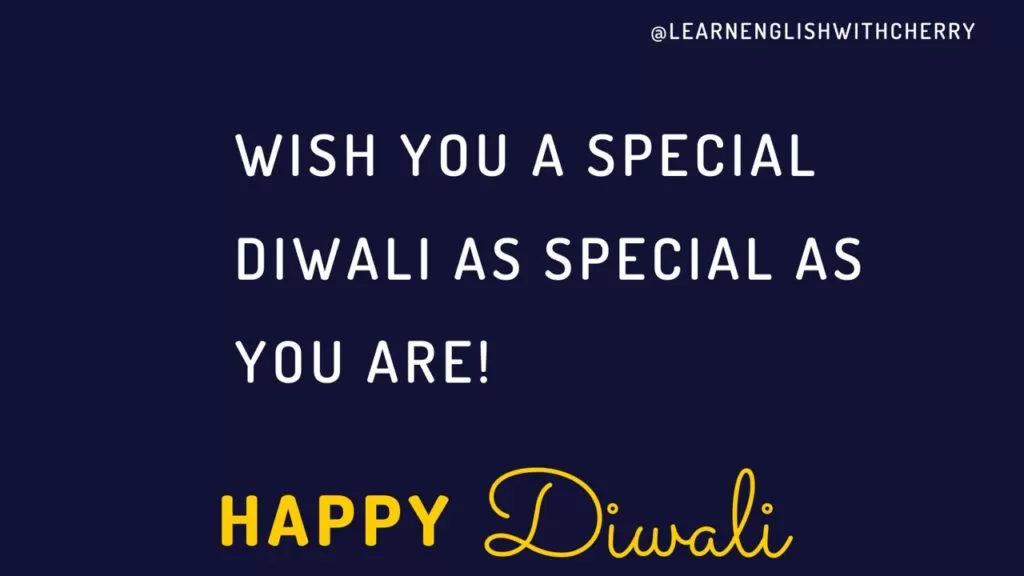
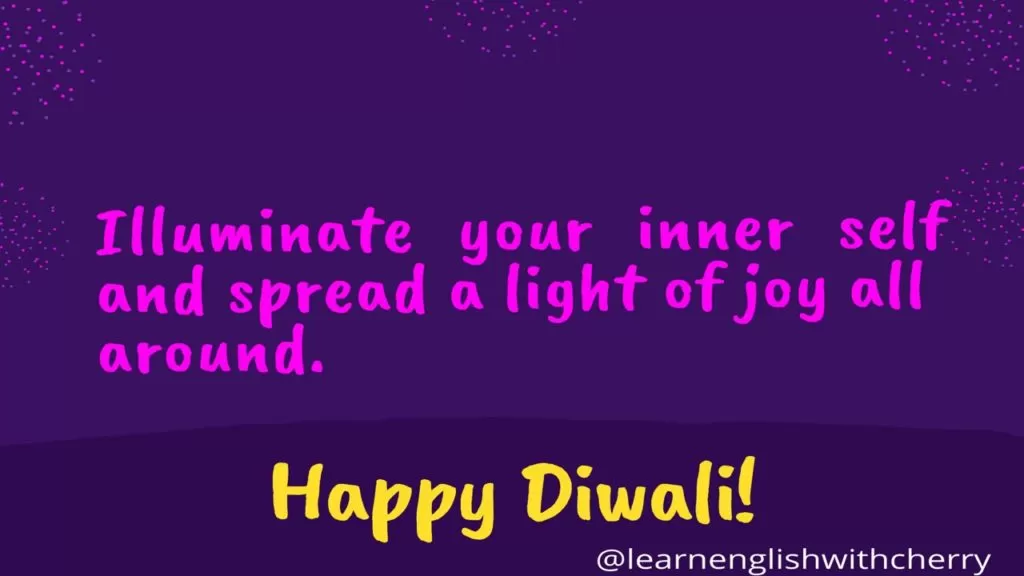
- Shine like sparkles, glow like candles and burn all the negativity like crackles. Wish you all a very lovely & cheerful Diwali!
- Life with you is like Diwali, therefore lets promise to be together like that forever. Wish you a really ‘Happy Diwali’
- Happy Diwali everyone. Have fun!
- Wishing you all a very happy and safe Diwali. Stay safe and be responsible and have a blast!
- Wish you a special Diwali as special you are!
- Hope this festival will lighten up your life.

- With a hope you attain every success with every light that is lit on this day. Happy Diwali
- Illuminate your inner self and spread a light of joy all around.
- May this Diwali comes with brightness and give you great memories which stays forever with you.
- Doubt is like darkness, Trust is like light, There is no way to destroy light by throwing darkness in to it. So come together and enjoy the festival of lights.
- Sun glows for a day; candle for an hour; matchstick for a minute; but a wish glows forever. Here is my wish for a glowing Diwali and glowing life!
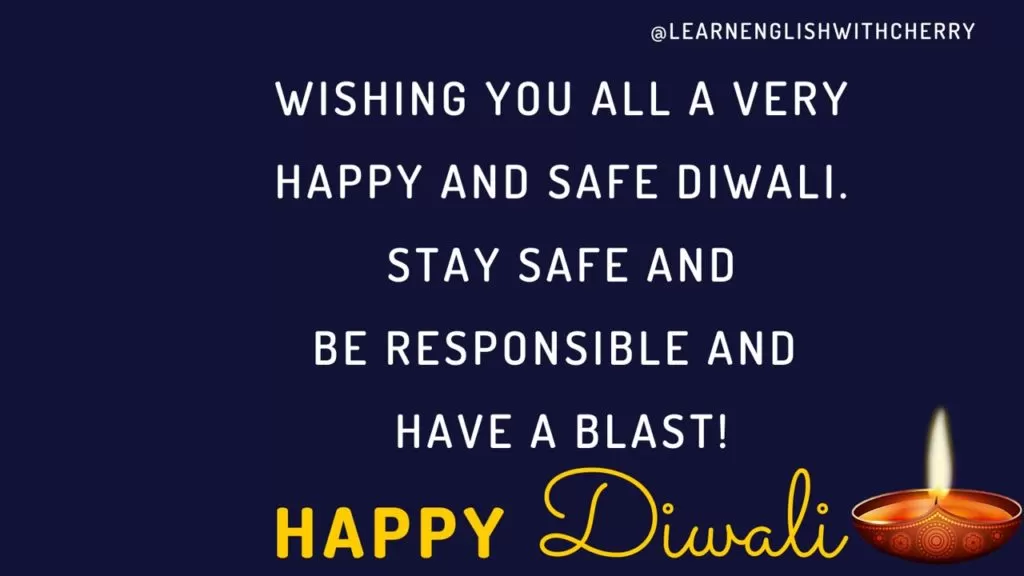
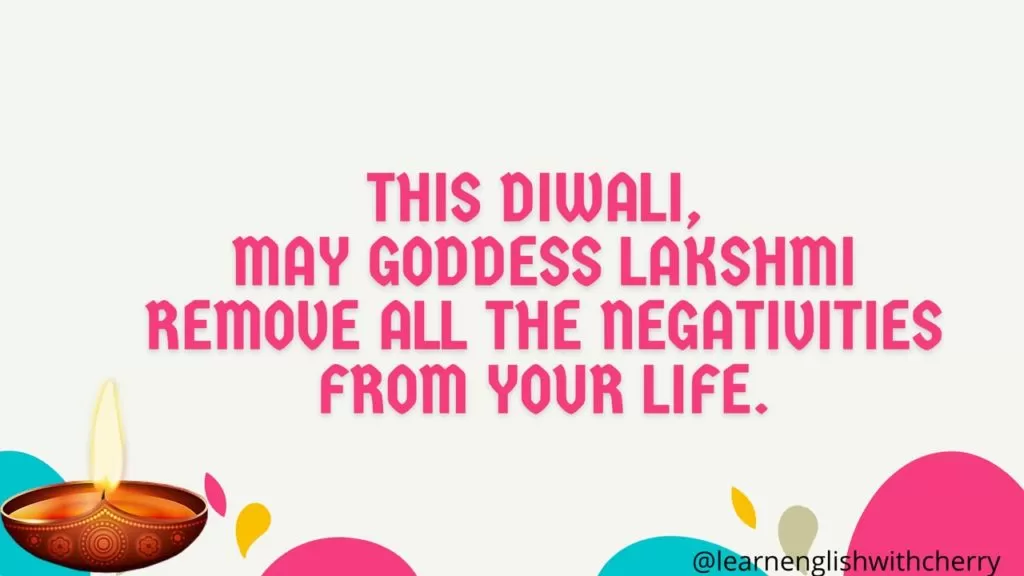
English conversation with kids
I have shared daily use English Sentences for English conversation with kids which can be used for English speaking practice with kids.
Learn more through this video on English conversation with kids:
Mom: बेटा, तुमने अपना सारा काम कर लिया?
(beta, tumne apna sara kaam kar liya)
Dear, have you completed all your work?
(डिअर, हैव यू कम्प्लीटिड आल युअर वर्क)
Kid : हाँ मैंने कर लिया है। – सब हो गया।
(haan maine kar liya, – sab ho gya)
Yes, Mom, I have done. – All caught up , Mom.
(येस, मोम आई हैव डन – आल काट अप मोम)
M: पक्का ?
(pakka)
Are you sure?
(आर यू श्योर)
K: हाँ, मम्मी।
(haan mummy)
Yes, Mom.
(येस, मोम)
K: नहीं मम्मी, एक बचा है ।
(nahin mummy, ek bacha hai)
No, Mom, Only one is left.
(नो, मोम, ओनली वन इज़ लेफ्ट)
M: कौनसा बचा है?
(kaunsa bacha hai ?)
Which one is left or incomplete?
(विच वन इज़ लेफ्ट ओर इनकम्प्लीट ?)
K: अंग्रेज़ी का, मम्मी।
(angrezi ka, mummy)
English, Mom.
(इंग्लिश, मोम)
K: मम्मी, मेरी बात सुनो।
(mummy, meri baat suno)
Mom, please listen to me.
(मोम, प्लीज़ लिसन टू मी)
M: बोलो!
(bolo !)
Speak up!
(स्पीक अप)
K: मम्मी ये कर दो।
(mummy ye kar do)
Mom, Please do this.
(मोम, प्लीज़ डू दिस)
M: अभी मैं व्यस्त हूँ।
(abhi main vyast hu)
I am occupied yet.
(आई एम् ओकूपाईड येट)
M: मैं बाद में कर दूँगी।
(mai baad mein kar dungi)
I will do it later on.
(आई विल डू इट लेटर ओन)
M: ये तुम खुद कर सकते हो।
(ye tum khud kar sakte ho)
You can do it yourself.
(यू कैन डू इट युअरसेल्फ)
M: मैं तुम्हारी शिकायतों से तंग आ चुकी हूँ।
(main tumhari shikayton se tang aa chuki hu)
I am sick and tired of your complaints.
(आई एम् सिक एंड टायर्ड ऑफ़ युअर कम्प्लेंट्स)
K: आप हमेश ऐसे ही कहते हो।
(aap hamesha aise hi kehte ho)
You always say this.
(यू ऑलवेज से दिस)
K: मम्मी आप ये भी नहीं कर सकते ।
(mummy aap ye bhi nahin kar sakti)
Mom, You can’t even do this.
(मोम, यू कैन नॉट इवन डू दिस)
M: तुम्हे क्या लगता है, ये इतना आसान है।
(tumhe kya lagta hai, ye itna aasan hai)
Do you think it’s a piece of cake?
(डू यू थिंक इट्स अ पीस ऑफ़ केक)
M: तुम्हारा जूता उल्टा पड़ा है।
(tumhara joota ulta pada hai)
Your shoes is lying upside down.
(युअर शूज इज़ लाइंग अपसाइड डाउन)
M: जूता सीधा कर दो।
(joota seedha kar do)
Turn the shoe upright.
(टर्न द शू अपराईट)
K: ओके मम्मी।
Ok, Mom.
M: अरे, तूने टी-शर्ट उलटी पहनी है।
(arre, toone T-shirt ulti pehni hai)
Hey, You have worn T-shirt inside out .
(हे, यू हैव वोर्न टी -शर्ट इनसाइड)
M: बॉल में हवा भर लो।
(ball mein hawa bhar lo)
Inflate the ball.
(इन्फ्लेट द बॉल)
K: ओके मम्मी।
Ok Mom.
M: बॉल में से थोड़ी हवा निकाल दो।
(ball mein se thodi hawa nikaal do)
Deflate the ball a bit.
(डिफ्लेट द बॉल अ बिट)
K: ओके मम्मी।
Ok Mom.
M: तुम ये काम कर सकते थे।
(tum ye kaam kar sakte the)
You could have done this work.
(यू कुड हैव डन दिस वर्क)
M: तुम आज अपनी ऑनलाइन क्लास लगा सकते थे।
(tum aaj apni online class laga sakte the)
You could have joined your online class today.
(यू कुड हैव जॉइनड युअर ऑनलाइन क्लास टुडे)
M: तुम टेस्ट दे सकते थे।
(tum test de sakte the)
You could have taken the test.
(यू कुड हैव टेकन द टेस्ट)
M: तुम पार्टिसिपेट कर सकते थे।
(tum participate kar sakte the)
You could have participated in.
(यू कुड हैव पार्टी सिपेटिड इन)
K: माँ, मुझे यह नहीं खाना था।
(maa, mujhe ye nahin khana tha)
Mom, I didn’t have to eat this.
(मोम, आई डिड नॉट हैव ईट दिस)
M: तुम कुछ और खा सकते थे।
(tum kuchh aur kha sakte the)
You could have eaten something else.
(यू कुड हैव ईटन समथिंग एल्स)
M: मुझे तुम्हारे पापा से पूछना पड़ेगा।
(mujhe tumhare papa se poochhna padega)
I’ll have to ask your father.
(आई विल हेव टू आस्क युअर फादर)
M: मुझे तुम्हारी टीचर से पूछना पड़ेगा
(mujhe tumhari teacher se poochhna padega)
I’ll have to ask your teacher.
(आई विल हैव टू आस्क युअर टीचर)
M: मुझे तुम्हारी टीचर को बताना पड़ेगा।
(mujhe tumhari teacher ko batana padega)
I’ll have to tell your teacher.
(आई विल हैव टू टेल युअर टीचर)
M: तुम्हे अभी होमवर्क करना ही पड़ेगा।
(tumhe abhi homework karna hi padega)
You’ll have to do your homework now.
(यू विल हैव टू डू युअर होमवर्क नाओ)
M: क्या तुम्हे अभी जाना पड़ेगा?
(kya tumhe abhi jana padega)
Will you have to go right now?
(विल यू हैव टू गो राईट नाओ)
Daily Use English Sentences – day 5
Beginners in English can use these Daily Use English Sentences for their English speaking practice.
- He kept mum like the rest.
- ही कैप्ट मॅम लाइक द रैस्ट |
- वह बाकी लोगों की तरह चुप रहा।
- (veh baki logon ki tarah chup raha)
- Did she create a scene there?
- डिड शी क्रिएट अ सीन दिअर ?
- क्या उसने वहाँ तमाशा बनाया ?
- (kya usne vahan tamasha banaya)
Vdieo help:
- I didn’t sleep well.
- आइ डिड नाट सलीप वैल |
- मैं सही से सो नहीं पाया।
- (main sahi se so nahi paya)
- Did you go to see his father to the hospital?
- डिड यू गो टू सी हिज़ फादर टू द हाॅस्पिटल ?
- क्या तुम उसके पापा को देखने हस्पताल गए थे ?
- (kya tum uske papa ko dekhne haspatal gye the?)
- Why did he praise me to the sky?
- व्हाय डिड ही परेज़ मी टू द स्काय?
- उसने मेरी बहुत तारीफ क्यों करी ?
- (usne meri bahut tareef kyun kari?)
These daily use English sentences are in past tense which are used while talking about past incidents.
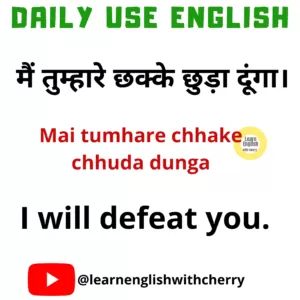
- Why did you go back on your words?
- व्हाय डिड यू गो बैक आॅन यूअर वर्डज़
- तुम अपने वादे से क्यों मुकर गए ?
- (tum apne vade se kyun mukar gye?)
- Who called you here?
- हू काल्ड यू हिअर ?
- तुम्हें यहाँ किसने बुलाया था ?
- (tumhein yahan kisne bulaya tha?)
8. I did it against my will?
(maine yeh apni marji ke khilaf kiya.)
- He took my advice amiss.
- आइ डिड इट अगेंस्ट माय विल |
- मैनें यह अपनी मर्जी के खिलाफ किया।
- (usne meri salah ka galat matlab nikala)
You can also watch video on ‘ Daily use English Sentences ‘ on my YouTube channel ‘Learn English with cherry’.
- I got wind of this matter?
- आइ गाट विंड आफ दिस मैटर |
- मु़झे इस बात का पता लग गया।
- (mujhe is baat ka pata lag gya)
- She kicked of her servant.
- शी किक्ड आफ हर सरवैंट |
- उसने अपने नौकर को निकाल दिया।
- (usne apne naukar ko nikal diya)
As these daily use English sentences are in simple past tense which shows that you are talking about something that has already happened.
- You did a good job.
- यू डिड अ गुड जाॅब
- तुमने अच्छा काम किया।
- (tumne achha kam kiya)
- He was throttle to death.
- ही वाज़ थरोटल टू डैथ
- उसे गला घोट कर मारा गया।
- (use gala ghot kar mara gya)
- He was muffle to death.
- ही वाज़ मफल टू डैथ
- उसे मुंह में कपड़ा ठूंस के मारा गया।
- (use muhn mein kapda thoons ke mara gya)
- He was stabbed to death.
- ही वाज़ सटैब्ड टू डैथ
- उसे चाकू भोंक के मारा गया।
- (use chaku bhonk ke mara gya)
- He turned a deaf ear to my voice.
- ही टर्नड अ डैफ इअर टू माय वाॅयस
- उसने मेरी आवाज अनसुनी कर दी।
- (usne meri aawaz ansuni kar dee)
- He showed much patience.
- ही शाॅड मच पेशंस |
- उसने बहुत धैर्य दिखाया।
- (usne bahut dhairya dikhaya)
- I was annoyed still I kept quiet.
- आइ वाज़ अनाॅयड स्टिल आइ कैप्ट क्वाइट |
- मैं गुस्सा था फिर भी चुप रहा।
- (main gussa tha phir bhi chup raha)
- We got to know in time.
- वी गाॅट टू नाॅअ इन टाइम |
- हमें समय रहते पता चल गया।
- (hanmein samay rehte pata chal gya)
- I heard this through a friend of mine.
- आइ हर्ड दिस थ्रू अ फरैंड आफ माइन
- मैनें यह अपने दोस्त से सुना।
- (maine yeh apne dost se suna)
Twin words in English with Hindi meaning- English Vocabulary with Hindi Meaning
I have explained 10 Twin words in English with Hindi meaning in this topic.
Video help for Twin words in English:
Here are 10 Twin words in English:
1. Wear and Tear:
2. Tooth and Nail:
3. Thick and Thin:
4. Take it or leave it:
5. Spick and Span:
6. Sooner or later:
7. Sick and tired:
8. Mind your P’s and Q’s:
9. Pros and Cons:
10. More and Less:
1. Wear and Tear:
This will not include in normal wear and tear of the product.
(इसमें चीजों का टूटना फूटना / घिसाई शामिल नही होगा | )
(थिस विल नॉट इन्क्लूड इन नार्मल वेअर टेअर ऑफ़ ऑफ़ द प्रोडक्ट |)
Isme cheejo ka tootna footna / ghisayi shamil nhi hoga .
Most tires will last for four years with normal wear and tear.
Minor damage of the luggage is caused by normal wear and tear.
2. Tooth and Nail: With all power
We fought tooth and nail but lost.
(hum jee jaan se lade lekin haar gye)
I know your brother has fought tooth and nail to get it.
मुझे पता है तुम्हारे भाई ने इसे प्राप्त करने के लिए जी जान लगा दी |
Mujhe pta hai tumhare bhai ne ise prapt karne ke liye jee jaan lga de.
3. Thick and Thin: In good and bad times
They were together through thick and thin.
(ve ache aur bure vaqt mein ikkathe hi rahe)
She’s always been there for me through thick and thin.
(usne hamesha har ache bure vaqt mein mera saath diya)
4. Take it or leave it:not negotiable
The car costs $5000, take it or leave it.
Its costs $20, take it or leave it.
(iski keemat $20 hai, koi tol mol nahi)
5. Spick and Span: perfectly clean & tidy
After a couple of hours of cleaning, the house was Spick and Span.
(kuchh ghante safai ke baad ghar saaf suthra hai)
6. Sooner or later: Eventually
She’ll get what she deserves sooner or later.
(usko kabhi na kabhi wo mil hi jayega jiski wo yogya hai)
7. Sick and tired: fed up(tang ana)
I am sick and tired of your complaints.
(Main tumhari shikayton se tang aa chuki hu.)
8. P’s and Q’s: Manners
Mind your P’s and Q’s.
(apne shishtachar ko yaad rakho)
Mend your P’s and Q’s.
(apni aadtein sudhar lo)
9. Pros and Cons: advantages and disadvantages(fayde or nuksaan)
We’ll weigh the pros and cons of your proposal and get back to you.
(hum aapke prastav ke fayde nuksaan dekhkar aapko jwab denge)
10. More and Less: almost
Alligators and Crocodiles are more or less the same.
तकरीबन तक़रीबन एक जैसे है |
Alligators and Crocodiles takriban takriban ek jaise hai .
Basic English vs Advance English phrases
In today’s English Speaking lesson – Basic English vs Advance English phrases – Advance English words and phrases you will learn both basic English words and phrases for daily use.
Video for help:
- Mai aap se question poochhna chahta hu.
- मैं आपसे प्रश्न पूछना चाहता हूँ |
- Simple English : I want to ask you a question.
- Advance English : I want to pick your brain.
- Aapko dyan dena chahiye.
- आपको ध्यान देना चाहिए |
- Simple English : You should focus.
- Advance English : You should keep your eye on the ball .
- आप बहुत दयालु हो|
- Aap bahut dyalu ho.
- Simple English : You are very kind.
- Advance English : You have a heart of gold.
- Yh padne ka vakt hai.
- यह पढ़ने का वक्त है |
- Simple English : It’s time to study.
- Advance English : It’s time to hit the books.
- Yh sone ka vakt hai.
- यह सोने का वक्त है |
- Simple English : It’s time to sleep.
- Advance English It’s time to hit the hay/ bed.
Basic English vs Advance English phrases are very useful to speak smart English.
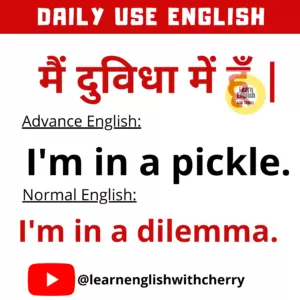
- Veh bahut mota hai .
- वह बहुत मोटा है |
- Simple English : He is so fat.
- Advance English: He is big boned.
- Veh bahut aalsi hai .
- वह बहुत आलसी है |
- Simple English : He is lazy.
- Advance English: He is couch potato.
- Mujhe ye karne se dar lagta hai.
- मुझे ये करने से डर लगता है |
- Simple English : I am scared to do this.
- Advance English: I have cold feet.
Watch video on Basic English vs Advance English phrases are very useful to speak smart English for more clarity of the topic.
- मै चुप रहूँगा |
- Mai chup rhunga.
- Simple English : I’ll keep quite.
- Advance English: You’ll zip your lips.
Mai poshtik aahar leta hu.
मैं पोष्टिक आहार लेता हूँ |
Simple English : I eat a balanced and healthy meal.
Advance English: I eat a square meal.
मुझे पक्का नहीं पता |
Mujhe pakka nhi pta.
Simple English : I am not sure about it.
Advance English: I am on the fence.
Kya tum pagal ho?
क्या तुम पागल हो ?
Simple English : Are you mad?
Advance English: Are you out of your mind?
तुमने जरूरी बात छोड़ कर बाकी सब के बारे में बात की |
Tumne jroori baat chhod kar baki sab ke baare me baat ki .
Simple English : You talked about everything except this important topic.
Advance English: you talked about everything except the elephant in the room.
Recent Comments